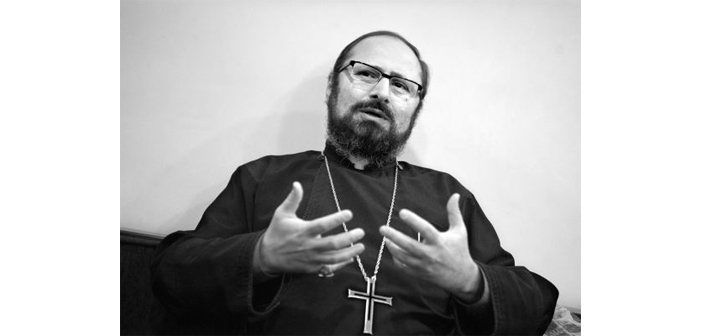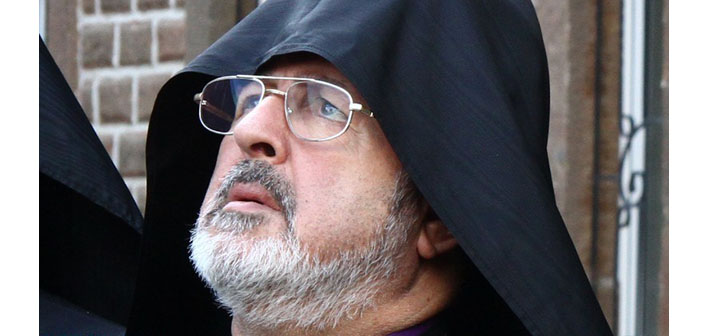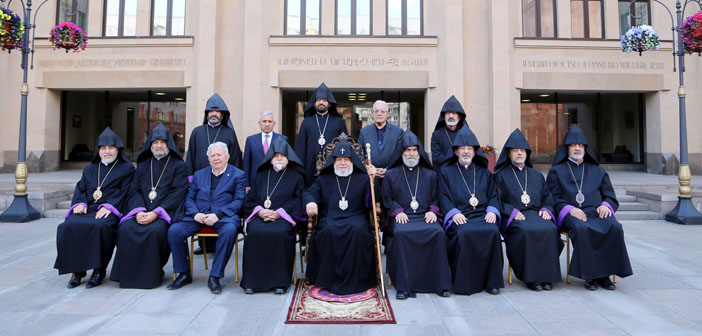The Armenian Patriarchate of Turkey made an important decision concerning the patriarchal election. With the decision of the Clerical Assembly, the process of election has officially started. Leading the meeting of the Assembly, Bishop Sahak Mashalian answered the questions concerning the background of this decision and the course of the election process. He stated that a committee consisting of clerics will apply for election.
First of all, can you
please talk about the background of the decision?
There have already been developments leading to this decision. As the head of the Clerical Assembly, I brought this issue forward. My arguments were solid. It was welcomed by all clerics, including His Eminence Aram and the way for this process was paved.
What do the decisions mean?
First of all, I should note that the meeting of the Assembly was really emotional. Some clerics even cried. For our dear Patriarch Mesrob is the teacher of every one in the Assembly and he is really important for all of us. We found some comfort in the fact that the decision is made without disrespecting our Patriarch. In fact, we haven't made any decision; we just determined the situation. For instance, we didn't decide to superannuate our Patriarch; he was already superannuated 8 years ago. And we didn't declared that “the seat is vacant”; it was already vacant, since our patriarch hasn't been on that seat for 8 years. We did what we had to do given these facts.
8 years ago, the Clerical Assembly had decided that Patriarch Mesrob “will remain as the patriarch until he dies”...
He will remain as patriarch until he dies and even after his death. However, by necessity, he will be “the retired patriarch” for the rest of his life. The clerics don't lose their title when they are dead. For instance, if Pope Benedict XVI could be referred as “retired Pope” (Pope Emeritus), then a patriarch could also be referred as “retired”. Thus, our Patriarch Mesrob will referred us “the retired patriarch” and we will pray for him. And he will be buried as patriarch, when he dies.
The Patriarchate concerns the entire Armenian Church
In the decision, it is stated that the patriarchal oath is not valid anymore. What does this mean?
After being elected, a patriarch can take up the position only after he takes the oath, since being a patriarch is not a sacrament that is bestowed to a person indefinitely; rather, it is a duty and responsibility that should be fulfilled. According to the canon law, we have the right to invalidate such oaths, when the duty is not fulfilled for at least 7 years. Furthermore, we also keep in mind that we are affiliated to the Armenian Apostolic church. The vacant seat of the patriarch doesn't only concern us; it concerns the entire Armenian church. The Catholicos of All Armenians His Eminence Karekin II, the Supreme Clerical Council and the Episcopal Assembly have been demanding an election in accordance with this law.
What should be the course of the process after this decision?
A written consent from the state is necessary for holding an election. The General Assembly will apply for electing our 85th patriarch. The Assembly decided that the application letter will be written by a committee consisting of four clerics (Bishop Sahak, Father Tatoul Anushian, Archpriest Krikor Damadian and Priest Drtad Uzunian).The petition signed by the General Vicar Aram Ateshian and the head of the Clerical Assembly Sahak Mashalian will be presented. There is one thing that we should note here: We don't ask for permission from the state. This is a religious matter; it is irrelevant for a secular state. We apply to the state for starting the process of a popular election. And the state will give us a consent which includes the guide and date for election.
No candidate would want to take that seat without popular vote
There are some concerns that the state might send a notice ordering to elect the patriarch by the votes of the clerics only...
Throughout the republic period, it is true that such things happened. However, in previous cases, the state was convinced to abandon such demands and let the popular election. According to the customs of our church, this is the most proper way of electing the patriarch. Greek Orthodox patriarchs or the pope have been elected in this way. However, our church has never elected a patriarch or catcholicos without the participation of the civilians. No candidate would want to take that seat without popular vote, since they know that their authority would be groundless in that way. I want to say that I would resist to such a decision by state, since it would mean pressure. However, I think that there is no need for such concerns.
How will the process go on after the consent?
The election committee will be formed in accordance with the guide. The candidates and the number of delegates will be determined in accordance with the districts. The candidates will choose their own delegates. The lists and committees of the ballots will be formed. 10 clerics that will be selected by the delegates and the clerics that are elected by popular vote will select the 85th patriarch and the 9 members of the Clerical Assembly. We will have enough time to talk about these details once we have the consent.
We are natural candidates
Will you be a candidate?
My answer to this question is always the same: I, as a bishop from Istanbul, am a natural candidate. I am aware that most of our people don't understand what this means. Let me explain: All the candidates, including me, are “natural candidates”; it doesn't matter whether they declare their candidacy or not. Making such a declaration before its time doesn't provide any advantage. By making such declarations, they become competitors of each other for an indefinite period. I say indefinite, because the process hasn't been started yet and we don't know when it will end. You see, Their Eminences Aram, Karekin and Sebuh have declared their candidacy and their relations to each other have been really tense for 8 years. There is no constructive dialog or cooperation among them. I have been criticized because I only say that I am a natural candidate, but this attitude saves from an unnecessary and untimely competition. In cases such as this, the civilians who are more royalist than the king turn the clerics against each other very easily. There is no need to count the chickens before they're hatched. Please have some patience.



.jpg)

